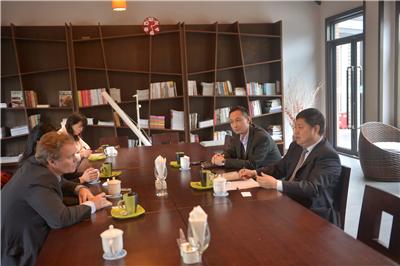 |
SHNU: On April 25th, SHNU President Zhang Minxuan met Bill Powell, the Asia Editor of Newsweek in SHNU and received the interview on research of PISA (Program for International Students Assessment). It lasted for about an hour, during which Zhang talked freely in English with the American editor. Zhang started the conversation by briefing on how he thought of beginning his PISA research through his former experience of a school teacher during the period of Chinese Cultural Revolution. In 1980s, he picked up comparative study of education after he came back to the university. In 1990s, he arrived in England to further his study there; meanwhile, he browsed through websites of different administrations of various countries to update the latest knowledge and development. In late 1990s, he began to study PISA for two motivations. One is that the inequality of education resource conditions in different parts of China, and the other is that he was invited by Shanghai Municipal Education Commission to act as the deputy director general to carry out the master plan and conduct education research in international fields. Zhang also mentions three motivations for PISA research: they would like to understand where Shanghai could be in the map of the world? His responsibilities of College Board Examination, and joining PISA would signify a large unique evidence-based database full of enquiries and questionnaire surveys. In 2010, China came to the top in PISA performances. This pushed the necessity of reforming and education across China. As both a decision maker of government education policies and a participant of education research, Zhang summarized 30 crucial issues for future development in his PISA research and enquired with the experts and government for information and evidences. He even brought forward the Green Index, which is supposed to improve the blindness and weaknesses of current education situations. He also cited statistics on the percentage of government funding spent on education of school at different levels, the four aspects of Chinese traditional culture and eight modern devices in education functioning. It is noted that the report on the interview would be printed on the issue of Newsweek. |
|
|



